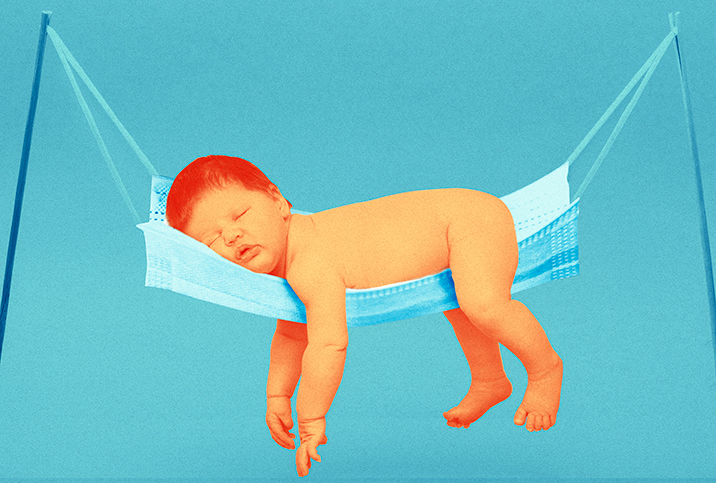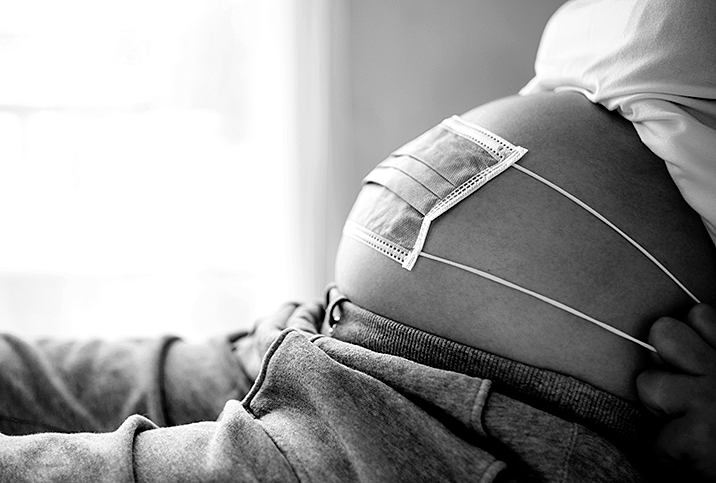Did the Pandemic Make Me Addicted to Having Babies?

A pandemic pregnancy is far from easy. Or convenient, for that matter. There are the solo ultrasounds, the masked childbirth and the studies promising that if I contract COVID-19, my baby will be harmed forever.
But holding my newborn, cozy at home while the world around us seemed to be imploding, brought a new level of gratefulness and focus to my family that I couldn't see in the hustle and bustle of pre-pandemic life. I found myself sheepishly admitting in friend groups that I might not be finished yet.
"But you already have four!"
I've heard that more than a few times. But in spite of that, I realized the pandemic had a rejuvenating effect—rather than the opposite—on my family planning. In the midst of the outcries (including my own) for improved maternity leave, child care systems, healthcare access and more, I found out that my big, loud, chaotic, hilarious family is what I value most. The rest sort of fell away.
A baby boom might follow the pandemic baby bust
It made sense that parents might freeze their baby-making plans when the pandemic began. It seemed like a completely volatile and dangerous time to bring a new life into a locked-down world. However, the National Bureau of Economic Research showed a "rebound" trend as well, reporting 62,000 fewer conceptions leading to a live birth early in the pandemic in 2020, followed by a rebound of 51,000 conceptions later that year. The projected "baby bust" was not as bad as had been projected.
Shahin Ghadir, M.D., a reproductive endocrinology and infertility specialist at Southern California Reproductive Center, said in spite of the numbers indicating a baby bust during the pandemic, I was not alone in wanting more kids.
"In about a year or two, we are going to see that we have had a bigger baby boom" he said. "People who are normally very active in their lives and work had to slow down. It became the perfect opportunity for them to pay attention to their family goals."
Ghadir also noted that he's seeing people who want larger families now as the pandemic played a role in helping them reassess the importance of family.
Biology and hormones at work
To determine if opting to have a basketball team's worth of children during a turbulent time in history is "normal" or completely crazy, I reached out to Lara Goodrich, a psychologist in Madison, Connecticut, who explained that on a basic level, our natural response was to go into "fight, flight or freeze mode."
"It feels most protective to kind of lay low and not add any big changes or responsibilities to the task of survival, and that's understandable. But…others have a different survival and coping response, so choosing to have a baby amid the backdrop of a widespread hardship could be the 'fight' response to take back a piece of control and to choose to shape their lives in a certain way," she said, adding that actively pursuing building a family can be an empowering way to move forward past the pandemic.
Goodrich said, "Historically, we've seen humans have big families to increase chances of survival. Historically, we've seen humans prepare for harsh seasons by sowing the earth and then they harvest for future months. So, during COVID-19, the trend for some was turning inward and focusing more on the home, food, health and family."
But Goodrich also cautioned against this mindset, encouraging people considering kids not to make decisions based on fear, and saying it's better to try to separate thoughts and emotions rather than being reactive or impulsive.
Instead of jumping into growing my family, I decided to sleep on it and use some birth control in the meantime.
Becoming a parent is more accessible
For some people, finding the time, energy and resources to get to a fertility clinic to address any issues was a logistical nightmare pre-pandemic. Ghadir said that before the pandemic began, just 1 percent of his patients opted for telehealth visits. Now only 1 percent opt to drive to his office, wait in a waiting room and take hours out of their day for a consultation. He added that since the pandemic restrictions eased, he's seen a 15 percent to 25 percent increase in requests for fertility appointments at his clinic.
He explained that women who had fertility intervention on their to-do list finally had the opportunity to get around to it, and most of his patients are still working from home. In addition, he's noticed the pandemic has caused more large employers to start helping to pay for fertility treatments. Ghadir hopes it becomes a universally covered benefit soon. This might help parents who want more kids to be able to access the care to make it happen.
I never thought I'd be someone considering having such a big family. I realize it's the result of having a support system that allows for it, and I remain aware that the pandemic has affected people in widely different ways, from personal trauma to job loss to mental health struggles. While the pandemic inspired me to rethink my family size and refocus on the family as one of the only things that really matter, for others, it exacerbated existing inequities, insufficient systems and more.
Goodrich said the pandemic "put us face to face with the things most of us would prefer to ignore," such as our own mortality and the fact that unwanted change is inevitable. Then I looked at my sweet kids. I realized building a family is one of those things that (to some extent) I could control and something that might just add more good to the world.
If we all look to add our own contribution of good to the world, maybe the good will prevail over the devastation. Somehow, I know that's true.


















